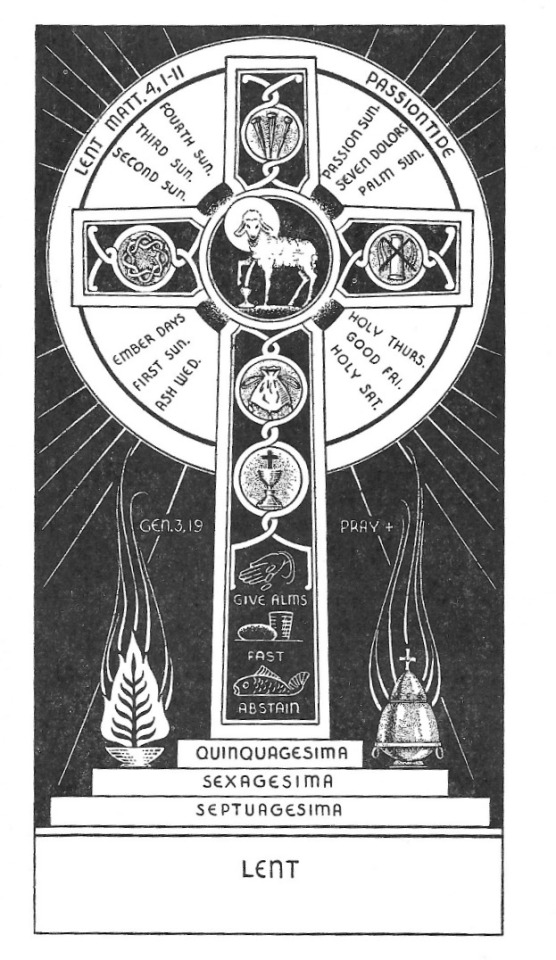#introit
Explore tagged Tumblr posts
Text
Sing to the Mountains
youtube
Sing to the mountains, sing to the sea. Raise your voices, lift your hearts. This is the day the Lord has made. Let all the earth rejoice. I will give thanks to you, my Lord. You have answered my plea. You have saved my soul from death. You are my strength and my song
Sing to the mountains, sing to the sea. Raise your voices, lift your hearts. This is the day the Lord has made. Let all the earth rejoice.
Holy, holy, holy Lord, heaven and earth are full of your glory.
Sing to the mountains, sing to the sea. Raise your voices, lift your hearts. This is the day the Lord has made. Let all the earth rejoice.
This is the day that the Lord has made. Let us be glad and rejoice. He has turned all death to life. Sing of the glory of God.
Sing to the mountains, sing to the sea. Raise your voices, lift your hearts. This is the day the Lord has made. Let all the earth rejoice.
0 notes
Text
youtube
1 note
·
View note
Text
Monks of the Abbey of Notre Dame - Introit Benedicta Sit (Latin)
#religious chant#monks of the abbey of notre dame#introit benedicta sit#latin#latine#lat#europe#2015#2010s#indoeuropean#romance#religious#traditional
0 notes
Text
The Classical Music of Ride, Part I: Mozart’s Requiem

You can’t trust anything or anyone in Ride. People aren’t who they seem to be. Every action, every event is just a cover for something else.
Is Morse one of the idle rich? An Oxford drop-out? A taxi-driver's son from Lincolnshire? A man who’s just finished a prison sentence? A policeman?
Long post....
Is Bixby the filthy rich head of a gambling empire? Is he just a front for Harry Rose’s criminal empire? Is he Charlie Greel looking to win back Cathy or Joss Bixby looking to seduce Kay? Is he even himself or is he his hidden, evil twin Conrad?
Are the denizens of Lake Silence really Morse’s friends—sheltering him after the storm of Blenheim Vale and prison? Or are they a bunch of dysfunctional philanderers and addicts? Even worse, are they suspects? Criminals?
Using Mozart’s Requiem in this episode must have absolutely delighted the music staff because while a great part of its fame and mystique rests on the sheer accumulation of stories and legends that have grown up around it, almost none of those tales can be proven—and all of them have been challenged at some point. You really don't know what's real and what's not—right down to the music itself.
Was the anonymous “stranger cloaked in gray” who gave him the commission the only sponsor Mozart ever saw? Or did he at some point become aware that the Count, Franz von Walsegg, was paying for the work? Some people today are shocked to hear that Walsegg planned to pass off the Requiem as his own work—as a tribute composed in memory of his dead wife—but that was a fairly common practice for the aristocracy of the time. It was considered slightly shady, but the proper thing to do was to just politely nod and go along with it.

Did Mozart, his mind disturbed by illness in his final days, truly come to believe that he had been poisoned and that he was writing the requiem mass for his own funeral? Or was that tantalizingly dramatic detail added by his widow Constanze to drive up sales of the score after the his death? The couple was catastrophically bad at managing money and when her husband died, the widowed Constanze was left with massive debts and two small children. She needed to maximize any possible source of revenue.
Her story certainly captured the public imagination. Pushkin took that little tidbit about writing his own funeral mass and wrote a very short but thought-provoking play in which he cast Mozart’s contemporary Salieri as the envious poisoner and Mozart himself as a childish, spoiled, and petty genius. Peter Shaffer later adapted Pushkin’s work into the play, and later film, Amadeus. A surprising number of people today believe Amadeus to be not the work of imaginative fiction that it is, but rather a completely factual story of Mozart’s life and death.

Mozart worked on the Requiem up to the day he died at the age of only 35. It was the last piece he worked on. Most scholars believe the manuscript we have contains not only the last music he ever composed but possibly the last words he ever wrote.
As far as authorship is concerned, we know for certain that Mozart himself completed “in skeleton” the Introit, the Kyrie, and almost all of the Sequentia (Dies irae, Tuba mirum, Rex tremendae, Recordare, Confutatis). The last portion of the Sequentia, the Lacrimosa, was completed was the up through the first 8 bars.
The last words that he actually wrote were "Quam olim da capo” — which instructed the musicians to repeat the "Quam olim" fugue of the Domine Jesu from the beginning. In yet another mysterious twist to the story of the Requiem, these actual last words were stolen—quite literally by tearing them from the manuscript—while the score was displayed at the 1958 World’s Fair in Brussels. They are still missing.
We are certain about the authorship of parts because we have the autograph manuscripts—the music in Mozart’s very own hand. The big question, however, has always been, how much the the rest of the Requiem can we consider his? The parts that were completed “in skeleton” basically had all of the “important” notes in place. Things missing include details like doubled parts that could fairly easily be extrapolated from what he had written.
In order for Constanze to receive her money from Walsegg, however, she needed to make it appear that Mozart had completed the work entirely or almost entirely himself before his death. Not only would this ensure full payment from Walsegg, it would also promote sales of the score to the public later. A work written by Mozart alone would far out-sell a work written by Mozart and “Mr. Competent-But-Lesser-Known-Composer.”
Today we know that at least two of Mozart’s students were involved in finishing the piece, with the majority of the work being done by Franz Süssmayr. What we don’t know, however, is how much of the completed work is purely theirs and how much came from Mozart’s notes and verbal instructions.

Some versions of the story indicate that Mozart gave detailed deathbed instructions and left many “little scraps” of paper with details of how to complete the composition. Other versions claim that this talk of “little scraps” is simply more of Constanze’s effort to maximize Mozart’s contributions and minimize those of others.
Regardless, we know that the completed Requiem was eventually sent (with Mozart’s counterfeited signature!) to Count Walsegg and dated 1792—which is rather odd in retrospect given that it was well-known that Mozart had died on 5 December 1791. It's always been yet another mystery.

The two excerpts used in Ride are the Lacrimosa, during the opening titles and establishing scenes, and the Confutatis, which Morse is listening to on his record player as he splits wood outside the lakeside dacha.
The Latin text of the first reads:
Lacrimosa dies illa, Qua resurget ex favílla Iudicandus homo reus: Huic ergo parce, Deus:
The equivalent translation (i.e. not the one used at mass, but a more literal translation) is:
Tearful [will be] that day, on which from the glowing embers will arise the guilty man who is to be judged: Then spare him, O God.
So Ride starts with tears and guilt.
I’ve always found it interesting that this text doesn’t even try to claim innocence, instead it very clearly asks that the guilty be shown mercy.

The Latin text of the second reads:
Confutatis maledictis, Flammis acribus addictis, Voca me cum benedictis.
The equivalent translation is:
Once the cursed have been silenced, sentenced to acrid flames, Call me, with the blessed.
This text always strikes me as coming almost from a child’s point of view. Basically one interpretation is, “Come and get me once you’ve taken care of all the bad guys.” I'll leave you to draw your own conclusions as to how that might apply to Morse post-Blenheim Vale and prison.
Next week: The Classical Music of Ride, Part II: Rigoletto or “Why keeping a person’s entire existence a secret leads to Bad Things.”
Special Bonus Section!!!
Parts of Mozart’s Requiem used in Endeavour:
Dies irae: completed by Mozart in skeleton* S4E4: Harvest (~2 min) (~3 min)
Rex tremendae: completed by Mozart in skeleton* S9E3: Exeunt(~1 h 11 min)(~1 h 11 min)
Confutatis: completed by Mozart in skeleton* S3E1: Ride (~5 min)
Lacrimosa: completed by Mozart in skeleton* through measure no. 8 S2E3: Sway (~0 min)(~1 hr 24 min); S3:E1 Ride (~1 min)
Lux aeterna: Not in Mozart’s MS; however Süssmayr reuses the Requiem aeternam written by Mozart almost note-for-note with just the different text S9E3: Exeunt (~31 min)
*skeleton: means full vocal and continuo parts, notes for prominent orchestral parts and musical bridges
46 notes
·
View notes
Text
Suggested by anon
103 notes
·
View notes
Text

Reformation Sunday
October 27, 2024
Pastor Tom Steers
Christ the Saviour Lutheran Church, Toronto
The hymns in this service were written by Martin Luther and sung during the Reformation
OPENING HYMN 556 “Dear Christians, One and All, Rejoice”
youtube
CONFESSION AND ABSOLUTION Page 184-185
THE INTROIT
Psalm 91, verses 1-4
1 Whoever dwells in the shelter of the Most High will rest in the shadow of the Almighty. 2 I will say of the Lord, “He is my refuge and my fortress, my God, in whom I trust.” 3 Surely he will save you from the fowler’s snare and from the deadly pestilence. 4 He will cover you with his feathers, and under his wings you will find refuge; his faithfulness will be your shield and rampart.
COLLECT PRAYER:
Almighty and gracious Lord, pour out Your Holy Spirit on Your faithful people. Keep us steadfast in Your grace and truth, protect and deliver us from false doctrine, and defend us against all enemies. Help us to remember that we are saved by Your Grace alone, through faith alone, in Jesus Christ alone. Grant that Your Church preach the purity of this Gospel, through Jesus Christ, Your Son, our Lord, who lives and reigns with You and the Holy Spirit, one God, now and forever. Amen.
OUR BIBLE READINGS: First Reading -- Ephesians 2: 4-9 Psalm 46 Second Reading -- Romans 1: 16-17 Third Reading -- Romans 3:19–28
THE APOSTLES’ CREEED Page 192
HYMN OF THE DAY 657 “A Mighty Fortress Is Our God”
youtube
THE SERMON
Five centuries ago, Martin Luther posted a challenge to the catholic church on the door of his Church.
This simple act started the Reformation.
Neither the Church, nor the world, would ever be the same.
Luther’s challenge was called the 95 Theses, or arguments against indulgences.
It questioned the catholic church’s practice of forgiving sins based on the payment of money.
Luther made the startling Biblical argument that God forgave sins based on faith in Christ and repentance, not cash.
Luther was a monk, priest, and Professor of Theology.
He had been giving university lectures on the Book of Romans and Galatians.
To do that he’d studied the words carefully.
Before becoming a monk, Luther had been trained as a lawyer.
He was exacting.
He read the New Testament in the original Greek.
What Luther found amazed, and ultimately comforted him.
But much more importantly, it brought Christianity back to the truth of the Bible, to the Gospel.
It restored our understanding that we’re saved by God’s grace alone, through faith alone, in Jesus Christ alone.
The Church 500 years ago taught a distorted theology that either terrified Christians or drove them to despair.
It claimed we are, in part, responsible for our own salvation.
Jesus does His best, then we have to do the rest.
The catholic church still teaches this terrible error
Other heretical churches say we ‘choose’ Christ; we ‘make a decision’ to be saved.
The baptists, pentecostals, presbyterians, and many other denominations teach this falsehood.
All these heresies cause believers to lose hope that they can ever be good enough to merit God’s forgiveness.
They place the focal point of salvation on us, rather than Jesus.
The catholic church taught that Jesus was an angry avenger, waiting to condemn less than perfect human beings to eternity in hell.
But Luther went back to the Word of God, and specifically the Apostle who wrote most of the New Testament letters.
He found in the divinely inspired words of Paul a clear and constant theme: our sin debt was paid by what Jesus did for us on the cross, not by our own ‘works’ or merits.
Through faith in Christ’s once and for all payment for our sins,
we’re forgiven and granted eternal life.
And Luther found the Bible taught that faith itself is a gracious gift from God, His work in us.
At Luther’s time the catholic church sold pieces of paper, indulgences, with the pope’s seal.
They said that in exchange for money, the sins of the buyer would be pardoned.
The more money paid, the more forgiveness.
Luther was outraged, disgusted by this.
He saw his poor parishioners spend money on indulgences they needed for food.
Luther argued that there was no Biblical support for the sale of indulgences.
So, he did something many academics did at the time, he posted these Theses on the door of his church.
Today, that would be like putting something on a community bulletin board or posting it on social media.
And Luther did something extremely few churchmen at the time would ever do, he mailed a copy of the Theses to his archbishop, Albert of Mainz.
The subject was a sensitive one for Albert.
Albert had bought his position as archbishop from the pope for a sum of 21,000 ducats, or gold coins, a huge amount of money then.
The vatican’s sale of church positions was common.
The imperial bankers loaned Albert the money he needed for eight years.
The arrangement was that clergy in the catholic church who reported to Albert would sell indulgences to repay the loan.
You can imagine Albert’s reaction when the letter from Luther arrived with the 95 Theses.
Albert forwarded the letter and Theses directly to the pope.
For Luther, the sale of indulgences was an un-Godly abuse.
But Luther also realized the thinking that created the sale of indulgences was the same misinterpretation of Christianity that said people were responsible for saving themselves by what they ‘did.’
It could be paying to see the bones of saints, praying to statutes, or other un-Scriptural practices.
Luther came to understand from the Books of Romans, Galatians, and Ephesians that salvation was not something human beings could earn, or merit, in any way.
It was a loving God’s free gift through faith in Christ as Saviour.
For Luther it was not just what we say ‘no’ to about roman catholicism, but what we say ‘yes’ to in the Word of God, the Bible.
And that is the Gospel, which Luther said cannot be denied because of the word of man, whether it be a pope or anyone else.
So, we come to the pivotal verses in the Bible about salvation.
What theologians call ‘justification,’ or how we, as sinners, are made right with our perfect, Holy God.
In passages from Romans and Ephesians, Luther found the truth.
In Ephesians 2, verses 8 and 9, Paul wrote:
“For by grace you have been saved through faith. And this is not your own doing; it is the gift of God, not a result of works, so that no one may boast.”
In Romans 1, verses 16-17, the Apostle sets out the theme for the whole Book of Romans, and gives the key to how we’re saved:
“For I am not ashamed of the gospel, for it is the power of God for salvation to everyone who believes, to the Jew first and also to the Greek. For in it the righteousness of God is revealed from faith for faith, as it is written, ‘The righteous shall live by faith.’”
And as though that wasn’t enough, Paul goes on to make this even clearer in Romans, Chapter 3, verses 19-26.
We read these verses earlier in our service.
It’s the heart of the Gospel.
Luther said to misunderstand these words is to misunderstand Christianity.
Paul wrote:
We are justified by God’s grace as a gift, through the redemption that is in Christ Jesus, whom God put forward as a propitiation by his blood, to be received by faith.
This is all good news.
But even good news, the best news possible, has at times led some to worry, to doubt.
The question can come: if we’re saved by faith alone, is our personal faith sufficient?
We know Jesus says that even mustard seed faith is enough, but how do we know we even have that?
The problem with these questions is they take the focus off Jesus, and put it on us, and our faith.
Faith looks to Christ.
It’s a relationship in which God does everything.
Luther would write that we are utterly passive in this regard.
God is not responding to our faith, He’s giving us faith, in fact, He has given us the perfect faith of Jesus.
Luther called this the “glorious exchange.”
Jesus has taken our sins, and His perfection, including the perfect faith He has in the Father, has been given to believers.
Faith is not something we make better by trying harder to believe.
Faith is a sweet, simple present that God gives.
And for a gift to be a gift,
it only has to be accepted, it can’t be paid for, or earned.
An infant trusts his or her mother and father more than a hospital nurse.
This is not a thing the baby ‘decided’ to do.
The infant did not ‘will’ him or herself to have faith and trust.
It was a gift given by the loving nurture of the parents for the baby.
The little child who says “Daddy” or “Mommy” is expressing the relationship, not creating it with those words.
Many TV evangelists say we ‘make a decision’ to believe in Christ, but the Bible says it’s the other way around entirely.
As Jesus said to His disciples in John 15, verse 16, “you didn’t choose Me, but I chose you.”
The Apostle Paul wants to remove us from the “buy and sell” economy of salvation, a belief system that gives us the credit for being good enough to choose Jesus.
Paul wants to free us from all of that, because Jesus has set us free from it.
Paul explains that God loved you so much He sent His own son to die on the cross to pay for your salvation, and that’s paid in full.
These texts from Romans and Ephesians are at the heart of the Reformation.
Luther reclaimed the Gospel and turned the world of his time upside down.
We still feel the aftereffects, and spiritually benefit every day of our lives as believers.
It would be while preparing his lectures on Romans that Luther had his “tower” experience, in which he came to the realization through God’s Word that his deeds didn’t win God’s favour – it was God’s deeds in Christ.
When Luther felt the weight of having to earn his own salvation taken off of him, he wrote:
“All at once I felt that I had been born again and entered into paradise itself through open gates.
Immediately I saw the whole of Scripture in a different light.
I ran through the Scriptures from memory and found that other terms had similar meanings, for example, the work of God, that is, what God works in us; the power of God, by which He makes us powerful; the wisdom of God, by which he makes us wise; the strength of God, the salvation of God, the justice of God by which we are justified.”
To understand all this in an even clearer way, we need to understand a shortcoming of the English language.
Here’s the problem -- the natural English translation of verses 22 and 26 in Romans, Chapter 3, talks about our faith in Jesus.
But this is not what the text actually says in the Greek because of the limitations of English.
The Greek points to an interpretation that this is about Jesus’ faith.
The original Biblical language at verse 22 of Romans Chapter 3 is that the righteousness of God is through the faith of Jesus for all who have faith.
And so, we see in Romans, Chapter 3, that the salvation revealed, is revealed in the faith of Christ.
How are we to understand this?
As Biblical Christians we confess not only Christ’s divinity, but also, His humanity: He was both true God and true man.
To be fully human is to have the capacity to believe.
Christ had “faith,” a relationship of trust in the promise of God the Father in order to suffer and die a willing victim on our behalf.
He was not going to some sort of ‘make-believe’ death, but the real thing on the cross.
Jesus did not raise Himself from the grave.
The Bible is clear on this.
God the Father raised Him from the dead.
Jesus went into that grave believing.
The good news in this explanation of Romans is profound.
Even though our own faith is often weak and inadequate of itself, Jesus’ faith was not.
This also has deep implications for our understanding of Romans 1:16-17.
Because there is what can appear to be a strange phrase in Greek:
“The righteousness of God is revealed out of faith into faith.”
Literally it says that God’s righteousness is revealed out of faith -- the faith of Jesus, into faith, that is, our faith.
This is taking seriously what the writer of the Book of Hebrews says when he calls Jesus, “the author and perfecter of our faith.”
This sharing in the faith of Christ, this participation in the relationship of the Son to the Father, makes each of us different than we were before.
It gives us relief, joy.
It offers hope, that our salvation as believers has been accomplished for us, even when we feel lost.
Even when fears and momentary doubts trouble us.
The faith, the perfect faith of Jesus, seals our salvation as Christians.
His perfect life allowed Him to be the complete payment for our sins. It’s all God’s work in Christ.
It’s all accomplished for us by our Redeemer.
Christ alone.
May the peace of God won for us by our Lord and Saviour be with you this day.
May the truth and comfort of the Gospel, reclaimed by the Lutheran Reformation, be yours forever.
Amen.
PRAYERS OF THE CHURCH
SERVICE OF THE SACRAMENT Page 194
THE LORD’S PRAYER Page 196
THE WORDS OF OUR LORD Page 197
Pax Domini Pastor: The peace of the Lord be with you always. Congregation: Amen.
THE DISTRIBUTION
Post Communion Collect (Left-hand column) Page 201 Salutation and Benedicamus Page 201-202 Benediction Page 202
CLOSING HYMN 938 “In Peace and Joy I Now Depart”
youtube
#christian religion#christian#lutheran#faith#jesus#salvation#bible#evangelism#holy spirit#religious art#Youtube
5 notes
·
View notes
Text

Latin Mass, Low Sunday, Introit: "As newborn babes, desire the rational milk without guile, that thereby you may grow unto salvation. Rejoice to God our helper: sing aloud to the God of Jacob." 1Pet. 2:2 Ps. 80.2 Roman Catholic Daily Missal. Artwork: Giovanni Battista Salvi da Sassoferrato, Madonna With The Infant Christ Child Holding A Goldfinch On A String.
#Baby Jesus#Mary holy Mother of God#Blessed Virgin Mary#Latin Mass#Immaculate Conception#Roman Catholic Daily Missal 1962#Giovanni Battista Salvi da Sassoferrato#arte sacra#sacred art
7 notes
·
View notes
Text
Laurence Pike - The Undreamt-of Centre - "a requiem mass for drums, electronics and choir" based on the story of Orpheus
The Undreamt-of Centre is the fourth solo album by prolific Australian drummer/composer/producer Laurence Pike, an evocative, contemporary reimagining of the requiem mass. The album draws on the sounds of modern classical music, Japanese environmental ambient music, fourth world electronics, free jazz and the choral traditions of Estonia, with particular influence from Tallinn-based composer Tonu Korvits. Produced in collaboration with the Vox Sydney Philharmonia Choir, conducted by Pike’s childhood friend, composer Sam Lipman and recorded in a 19th century Gothic church. In memory of Tony Lake Music written and performed by Laurence Pike (copyright control): Drums, Percussion, Electronics, Piano, Synthesisers, Field recordings Choir orchestrated and conducted by Sam Lipman Vox Sydney Philharmonia Choir: Soprano - Hannah Alexander, Josephine Brereton, Amelia Myers Alto - Jasmin Borsovszky, Ines Obermair, Hannah Roberts Tenor - Josh Borja, Tom Hazell, Ezra Hersch Baritone - Finnian Murphy, Jesse van Proctor, Ziggy Harris Soloist on ‘Introit’ - Josephine Brereton I first had the thought of working with voices a number of years ago. I had the strange notion of making a requiem mass for drums, electronics and choir. It sat with me since then, until it felt the time was right to realise the idea. Why a requiem? Initially I simply liked the idea of a structural format that had existed and been reimagined again and again over hundreds of years. Ultimately, it’s a ritual set to music. The processes and ecstatic outcomes of rituals, were something I had explored in making the Holy Spring album in 2019. I became interested in subverting the religious musical construct of a requiem into something far more contemporary, using language and sounds not readily associated with it. It also seemed a ready-made vehicle to explore the sound of a choir with my electro-acoustic drum kit performances. It was the decline in health and death of my father-in-law in July 2021 which contextualised this idea for me, and I have dedicated the album to his memory. I had begun searching for a narrative structure or text that I might set a choir to, while not adhering to the text of a Latin mass. I began reading the poems of Rainer Maria Rilke, in particular his ‘Sonnets to Orpheus’, inspired by the classical Greek myth of Orpheus. Orpheus was the son of Apollo and was considered to be the greatest of all poets and musicians. His most famous myth involves the death of his beloved Eurydice, with Orpheus travelling to the underworld to make a plea to Hades to return her to life, which he grants on the condition that Orpheus can’t look back at her until they have returned to the realm of the living. As they reach the exit from the underworld and fearing he’d been tricked, Orpheus turns back to see her and she disappears forever. There suddenly seemed to me to be a convergence of thought between this myth (its rumination on mortality, acceptance, the human soul and our inability to control universal forces), my recent experiences, and the idea of a requiem – a musical ritual to mark the transition from life to death and beyond.
3 notes
·
View notes
Text
youtube
Frano Parać (b.1948) : Carmina Krležiana: 1. Introit ·
Zbor I Simfonijski Orkestar Hrvatske Radiotelevizije · Danijel Ljuboja · Dirigent · Oratorijski Zbor Crkve Sv. Marka Cantores Sancti Marci · Tonči Bilić
2 notes
·
View notes
Note
introit - if your muse could revive one person from the dead, who would it be and why?
Oren; Her instinct would be, of course, to revive one of her parents. However, they'd lived full lives & were so deeply, totally in love with each other that one simply would not want to live without the other. Oren couldn't have been older than 6-7, he'd barely lived and was a complete innocent. And she hates the thought of Fergus being completely alone in Highever.
Elethea lives with a lot of what-ifs throughout her life; but the what if of what Oren might have grown into is one of the biggest ones.
2 notes
·
View notes
Text
Tagumpay ng Pag-ibig
youtube
Magsaya, magalak, at magbunyi! Magsiawit ng mga papuri! Sapagkat sa atin ay muli nang nagbalik Siyang Hari natin ng pag-ibig!
Siya ang tagumpay na liwanag sa dilim Buhay Niya ay inialay sa atin Nang tayong lahat ay lubos na mabuhay At makapiling Niya habambuhay
Magsaya, magalak, at magbunyi! Magsiawit ng mga papuri! Sapagkat sa atin ay muli nang nagbalik Siyang Hari natin ng pag-ibig!
Siya ang tagumpay na pag-asa sa lagim Puso Niya ay binuwis para sa atin Nang tayong lahat ay lubos na manalig At makatulad Niyang umiibig
Magsaya, magalak, at magbunyi! Magsiawit ng mga papuri! Sapagkat sa atin ay muli nang nagbalik Siyang Hari natin ng pag-ibig!
Siyang Hari natin ng pag-ibig! Tagumpay ng pag-ibig! Pag-ibig, Tagumpay ng pag-ibig! (Hari ng Pag-ibig!) Pag-ibig, Hari natin ng Pag-ibig! (Tagumpay ng pag-ibig)
Pag-ibig, Hari natin ng Pag-ibig! Tagumpay ng pag-ibig!
#introit#pambungad na awit#tagumpay ng pag-ibig#pasko ng pagkabuhay#easter#behold the risen lord#norman agatep#agatep#lui morano#morano
1 note
·
View note
Note
introit - if your muse could revive one person from the dead, who would it be and why?
requiem for a meme.
connor guerrin. one of elspeth's greatest regrets is not saving him from the demon that took advantage of his good heart and his desire to help save his father. instead, she accidentally provoked a fight with the demon and killed him in the process. it weighs on her for the rest of her life, to be honest—and because she is also the sort to do for others before she does anything for herself, connor is the first person she would think of, even before her own nephew.
2 notes
·
View notes
Text
SEXAGESIMA SUNDAY, St Scholastica Novena – The FOURTH DAY, Nostra Signora del Fuoco / Our Lady of the Fire, Forli, Italy (1428), St Andrew Corsini and the Saints for 4 February
SEXAGESIMA SUNDAY: (Latin – Sexagesima, sixtieth) is the eighth Sunday before Easter and the second before Lent. The Ordo Romanus, St Alcuin and others, count the Sexagesima from this day to Wednesday after Easter. The name was already known to the Fourth Council of Orléans in 541. To the Latins it is also known as “Exsurge” from the beginning of the Introit. The station was at Saint Paul’s…

View On WordPress
#blrabanusmaurus#ourladyofthefireitaly#saints4february#standrewcorsini#staventinusoftroyes#stgilbertoflimerick#stgilbertofsempringham#stjanedevalois#stjohndebritto#stjosephofleonissa#stscholasticanovena
8 notes
·
View notes
Text
2 notes
·
View notes

